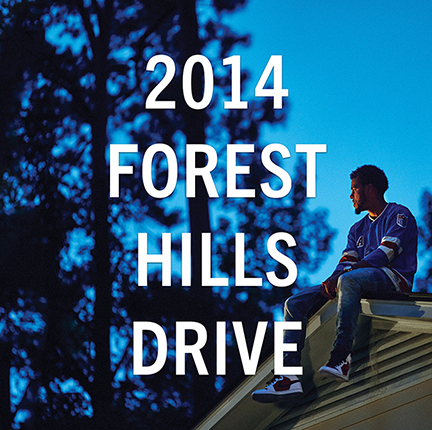
On this, the third studio album from J. Cole, the emcee is less muted than on prior projects. The relentless rhyming is marked by tinges of bitterness, introspection and observation. This is not a negative thing – in fact, 2014 Forest Hill Drive, is perhaps his best collection of tracks to date. The beats are more melodic and assist in bringing what he’s saying to the forefront. After the marketable success of Born Sinner, J. Cole seems intent on returning to the mic to drop a few gems that are extremely personal and less commercially glamorized.
The opener captures a rapper unveiling his authenticity singing across a jazz vibe and asking “do you wanna be happy?” The question offers a communicative depth that is intense given recent current events and J. Cole’s outspokenness about them. On “January 28th,” provides the rapper with a smooth beat to spit powerful bars over about the value of Black life – and more emphatically – Black men. It is difficult not to enjoy the cut nor feel as if J. Cole isn’t fed up with the utter disregard for the accomplishments, achievements and presence of Black people on the Earth that America has proven itself to have.
J. Cole shifts gears on “Wet Dreamz,” a nostalgic elegy to his virginity. On “A Tale of Two Citiez,” there is an anthemic undertone meant to provoke a reaction. The drums blare at the speakers during its “hands in the air” chorus that serve to deliver even more context to the song. “G.O.M.D.” is equally as vicious being a proverbial fuck you to anyone that disagrees with his perspectives. The song reveals an emcee not afraid of pushing the envelope and treading new horizons production wise.
On “Love Yourz,” J. Cole pens on the overwhelming obsession to fit in, outdo and keep up with the Joneses. It is simultaneously pensive and hard-hitting. The finale, “Note to Self” feels like a nod to singers that have come before him, and a bow to the fact that he’s crafted some of the most pointed punchlines ever on this album.
J. Cole first started gaining notoriety when he released his mixtape, The Come Up in 2007 and gained more steam in the genre with The Warm Up two years later. There is no denying that J. Cole set out with the intention of making a definitive statement that he isn’t going anywhere anytime soon with 2014 Forest Hills Drive. While some will argue it is sonically different in both rhymes and music from the prior two albums, this is the J. Cole that Hip-Hop needs. 2014 Forest Hills Drive by no means will resurrect what many consider a dead genre (even in the underground lane), but is a step in the right direction.

